
A number of you have asked me about my reactions to Peter Jackson’s three-part documentary about the Beatles – “Get Back” – now streaming on Disney Plus. Much has been written about this amazing look into the process that led up to the Beatles writing and recording of the “Let It Be” album, their rooftop concert, and the band’s subsequent breakup.
Many of these analyses and reviews are insightful and revealing; some, however, miss the point of the documentary, and what it means to not just fans of the Beatles, but to anyone in a position of creating media content in groups – such as most radio personality shows. I wanted to make sure I actually had something to say you haven’t read elsewhere, that also had some application to what many of us do – make radio.
I’ve read a number of these pieces, and I’ll quote several of them, letting you know sources and providing links to the articles. Why go to the trouble? Because Beatles fans – or better yet, fanatics – will hold your feet to the fire if you get it wrong.
I learned this the hard way nearly 40 years ago while programming WRIF here in Detroit. One of the major radio syndicators offered up a special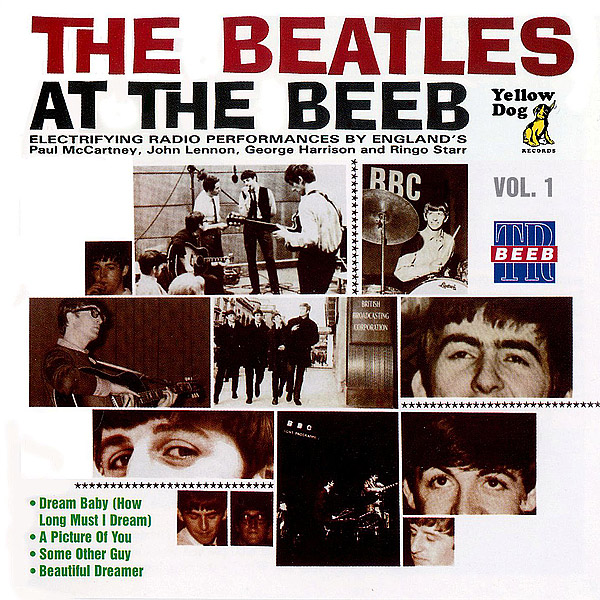 program called “The Beatles At The Beeb.” An archivist dug up old and rare recordings of the Fab Four on many UK television appearances before they broke out in 1964. It was packaged into a radio show for U.S. stations, and I immediately grabbed it, and built a Beatles weekend around it.
program called “The Beatles At The Beeb.” An archivist dug up old and rare recordings of the Fab Four on many UK television appearances before they broke out in 1964. It was packaged into a radio show for U.S. stations, and I immediately grabbed it, and built a Beatles weekend around it.
We had a Sunday night talk show back then – “Night Call” – four hours about what was happening in Detroit, the world, and in pop culture. And I thought it would be amazing to grab one of the insiders at the BBC who could talk about what it was like to discover these recordings, and talk about what they mean to us in 80’s.
I booked the BBC’s John Beeling (at least I think that’s who it was) for the show, and immediately called “Night Call’s” host, Mike Collins. As I excitedly told him about Sunday night’s special guest and theme, Mike told me that while he had always liked the Beatles, he really wasn’t one of their biggest fans. Perhaps someone else at the station might be better suited to host the show.
Surprise – I jumped at the chance. After all, I was all in with the Beatles in late 1963 when their music exploded across America’s Top 40 stations. My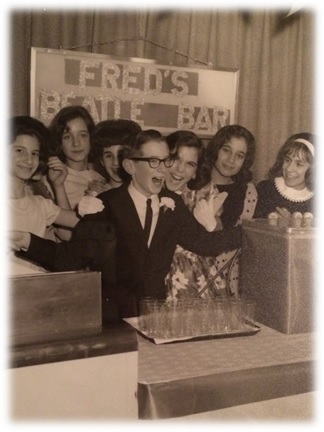 Bar Mitzvah was on February 15, 1964 – yes, right between the Beatles’ first appearances on “The Ed Sullivan Show” that month. In fact, the theme of my 13th birthday extravaganza was – The Beatles!
Bar Mitzvah was on February 15, 1964 – yes, right between the Beatles’ first appearances on “The Ed Sullivan Show” that month. In fact, the theme of my 13th birthday extravaganza was – The Beatles!
So, nearly two decades later, I popped on the headphones, opened the mic, and did a nicely written setup for the show, introduced and thanked Beeling who got up in the middle of the night to be our guest, and chatted with him for 10 or so minutes about how those tapes were discovered. I was talking to the right guy. It was evident Beeling knew his material well, and was very much a historian on the band, the British Invasion, and those exciting days before Beatlemania came to be.
I couldn’t help but notice the phones – they were going nuts, every line was lit, and there were lots of fanboys and fangirls waiting to ask questions. So, I took my first call, an obscure question about a B-side on the Vee-Jay label of the hit “Please Please Me.” I had actually bought that single, so I knew the answer. But once connected with our BBC expert, Beatles fans came out of the woodwork.
I knew early on that both the audience and Beeling knew a LOT more about those four mop tops than I ever would. So, I reduced my role to introducing “Scott from Livonia” or “Christie from Lake Orion,” letting the fans have their time with our British expert. The four hours flew by – and at 2 am, the phones were ringing off the hook.
I learned a lot that night about Beatles fandom, and through my associations with radio people like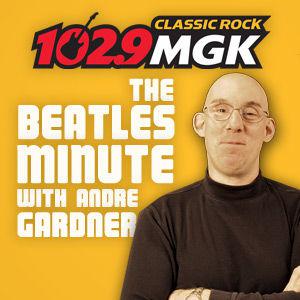 Doug Podell, André Gardner, Paul Ingles, Scott Segelbaum, and others that I was just a rank amateur when it came to Beatles trivia and the many backstories about the band, their rise to fame, the eventual breakup, and their staying power years later.
Doug Podell, André Gardner, Paul Ingles, Scott Segelbaum, and others that I was just a rank amateur when it came to Beatles trivia and the many backstories about the band, their rise to fame, the eventual breakup, and their staying power years later.
When the hype for “Get Back” began, there was no question I had to make the time to watch the whole shebang. And after much thought, a number of conversations with several clients and friends, I’ve made my list of takeaways from this amazing look inside a band, unlike anything we’ve seen before. As fans of any band or artist, I cannot think of another example where we’re treated to being a “fly on the wall,” watching the creative writing and recording process come together.
Like any trip into the “sausage factory,” it’s not always pretty or fun to see every little thing that goes into the making of a hit, like “Get Back.” And it’s certainly not efficient. But it’s fascinating to watch John, Paul, George, Ringo and a handful of producers, gophers, roadies, hangers-on, friends, and family try to gut out this process of writing, playing, recording, and just getting along.
This might have been an interesting documentary approach for the Stones, Michael Jackson, Talking Heads, or Garth Brooks. But it’s the Beatles, arguably the most successful and impactful rock band in history. And one in which the stories and rumors are etched into our psyches – about who broke up the band, how these sessions came together, and how the band ended up on the top of the Apple Building for their final performance.
1. The creative process can be brutal – Let’s start there. “Get Back” allows us to see the band’s dynamic as it existed in January 1969. We missed the last five years of their epic rise, as well as the formative years in Liverpool, Hamburg, and other destinations where these young guys worked themselves into becoming the Beatles.
I’ve talked to several people and read numerous articles about how director Jackson must have gotten lost in all the archival footage, leading him to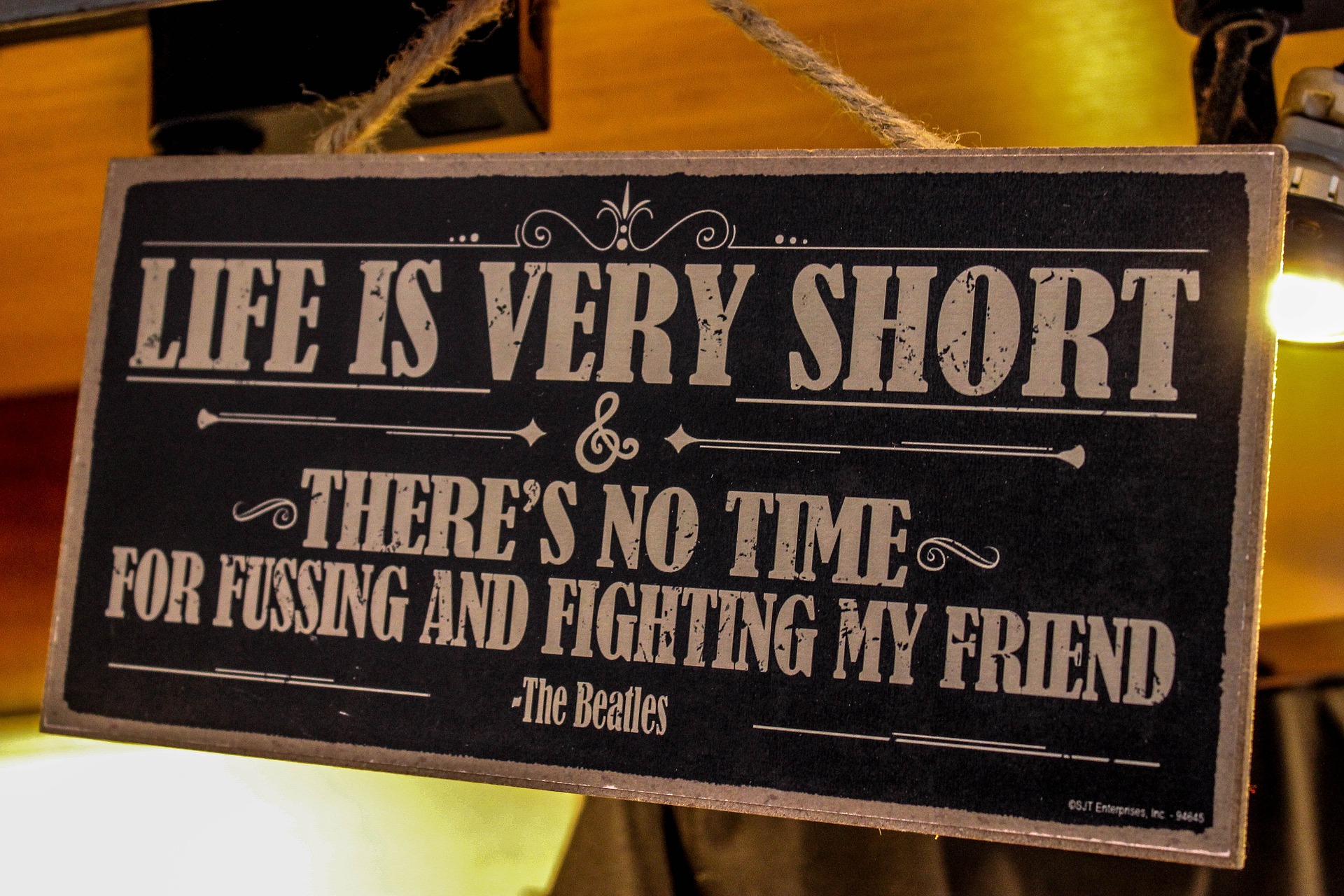 create a doc that’s, at times, excruciatingly long and winding. But that how it works.
create a doc that’s, at times, excruciatingly long and winding. But that how it works.
We have become so used to seeing how Hollywood depicts an athlete’s rehabilitation, an addict’s recovery, an author’s novel writing – often boiled down in a two-minute montage of heart-warming scenes set to the appropriate uplifting music bed.
There’s none of that in “Get Back.” Nor should there be. We see it all – the backbiting, the fussing and fighting, the passive aggressiveness, the jealousies, the reconciliations. In other words, its the sometimes painful machinations that are brutal but necessary when you’re in the business of making masterpieces, and the clock is running.
All that said, there are truly remarkable moments in the doc where a song seemingly starts out as a chord or riff, and develops in a few minutes (with a little help from the other band mates) into a full-blown song you’re been playing and singing for years.
I have seen managers (and I have likely been one) who has asked a morning show to create another benchmark bit, a new character, an event – and I’ve gotten those looks (OK, eyerolls) that are reminders that truly great pieces of art in whatever format you choose cannot simply be cranked out, much less duplicated anytime at all, on-demand.
2. Everyone has their roles – And in the Beatles, it is clear much of the band’s pecking order was created well before the cameras were turned on in the Twickenham studio where most of the early “Get Back” footage was shot.
Paul is the leader, reluctant much of the time. But I’ve seen the same dynamic on most personality shows. In a vacuum, someone’s got to step up and make the calls. John, while hilarious and brilliant, really wants little part of it. Maybe he already knows the credits are rolling, but much of the time, he’d rather let the others get their hands dirty.
make the calls. John, while hilarious and brilliant, really wants little part of it. Maybe he already knows the credits are rolling, but much of the time, he’d rather let the others get their hands dirty.
George is the young guy, almost like the former intern who worked his way into the ensemble. He has experienced the humiliation and pain of rejection in this band. The others don’t always see him on their level, he knows it, and it puts him in a horrible position of pitching songs and ideas, knowing most will end up on the studio floor.
And then there’s Ringo. I learned the most about his dynamic in the Beatles during “Get Back’s” seven+ hours. Of the four, he is the most charming, soulful, and quietly emotional. In scene after scene, he says little or nothing. But his eyes tell you all you need to know. Throughout much of “Get Back,” he’s sitting at his kit, waiting – and hoping – for the others to work their way out of the muck. I came away wanting to have a cup of coffee with him.
The part we can’t see is the years leading up to this episode. We don’t really know the evolution of these relationships, all of which no doubt were forming years before the making of this documentary.
3. Even the greatest talent need a skilled manager – For every general manager or radio owner who has ever wondered what do programmers do, the Beatles came up with the answer early in Part I. Their manager, Brian Epstein (pictured), has passed away from an accidental drug overdose at the age of 33. That tragic – and seminal event – occurred a year and a half before “Get Back” – and it is evident how it took its toll.
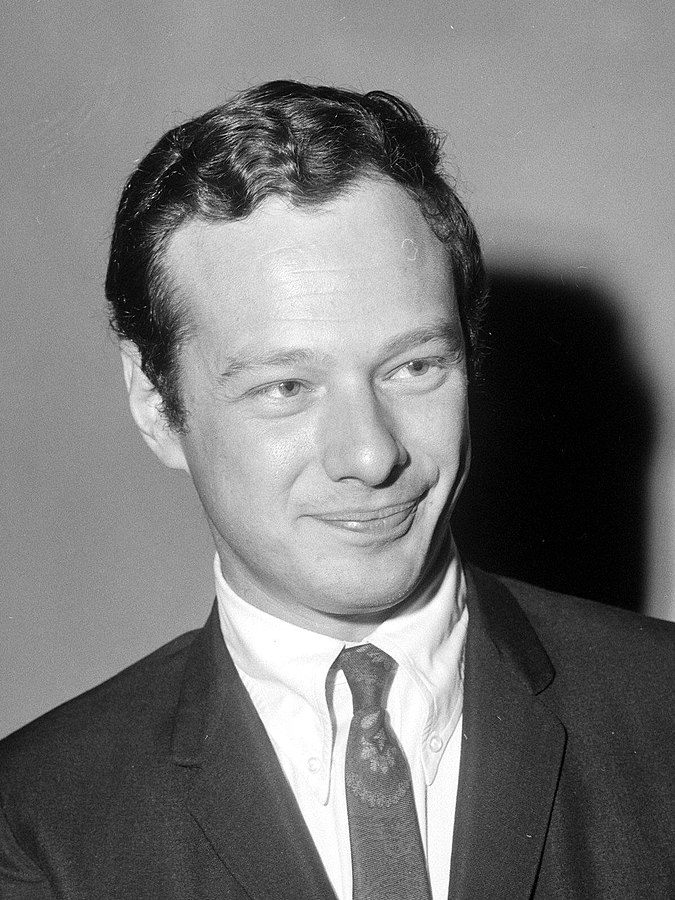
At the time, the Beatles opted not to replace Epstein. Instead, they chose to manage themselves. You can see the results throughout “Get Back,” but especially in the first installment where they cannot decide on anything – which songs to play, how to play them, who will play which part, the venue where they’ll perform live.
At one point, Paul – who early on becomes the reluctant de facto leader – a role he’d rather not have – blurts out this amazing confession while he, George, and John are discussing why they are not making any progress. The conversation opens with a decision about where to hold their live performance, coming up in just days:
John: “Leave it in the air and just think about it.”
…and wait a moment later
John: “But we can all say ‘yes’ now and somebody can decide ‘no’ tomorrow.”
…and a bit later:
Paul: “The people who are stupid are the four of us.”
George: “The Beatles have been in the doldrums for at least a year. Ever since Mr. Epstein passed away, it’s never been the same.”
Paul: “I mean we’ve been very negative since Mr. Epstein passed away…It’s discipline we lack. We’ve never had discipline. We had a sort of slight, symbolic discipline. Like Mr. Epstein s0rt of said ‘Get suits on’ and we did…There really is no one there to say ‘do it.’ Daddy’s gone away now, and we’re on our own at the holiday camp.”
That sums up why even the best of the best need leadership, guidance, direction – and someone who will tell them their baby’s ugly. You can see throughout “Get Back” where the Beatles miss the older, wiser, more objective Brian Epstein.
4. Environment matters – The studio that’s acquired for the Beatles is all wrong. The Twickenham location is big, impersonal, austere – and was probably acquired for the right price. We learn that in a matter of a few weeks, the space will be used for the filming of a new Peter Sellers film featuring Ringo: “The Magic Christian.” Obviously, someone got a good deal on it, but the Beatles have to finish their rehearsals and recording within just a handful of days so the movie can start shooting.
So, some money was saved. But what was the cost in stress, creativity, and comfort? Talent needs a facility where they can work together, get away from each other, and do what’s necessary to produce brilliant content. It is clear from the get-go the Beatles hate this place, and it takes its toll on the creative process already under considerable tension.
When they later move to the studio in the Apple building in Savile Row, there’s a sense of calm and comfort, being in a friendlier, warmer environment.
5. Outsiders can be very influential – or not – The narrative on the Beatles’ undoing has long blamed the discord on Yoko Ono. And in fact, she is present throughout much of the documentary. She is always seated right next to Lennon, in the circle with the other Beatles.
is present throughout much of the documentary. She is always seated right next to Lennon, in the circle with the other Beatles.
And she has little-to-no influence on any of the process. Most of the time, she is shown knitting, doing a crossword puzzle, reading, or in one revealing scene, schmoozing with Linda Eastman who would later become Paul’s wife.
If Yoko had a disruptive effect on the Beatles, it happened well before 1969 when this documentary was made. As rock bands go, the posse hanging out with the Beatles in the studio seems pretty intimate as these things go.
And if there are impediments to the band’s creativity, it’s not evident by the presence of Yoko or these outsiders.
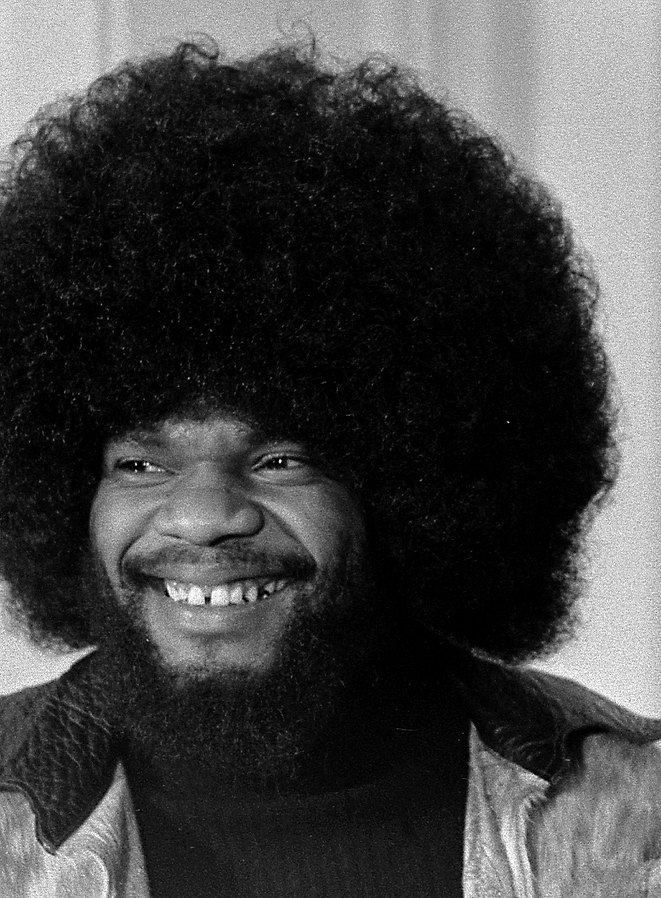
6. A new member of the team can help – You’ve seen it in sitcoms, and certainly with radio shows. Outside members of the band can pump in new energy. And perhaps the core team is on their best behavior. During “Get Back,” you hear the Beatles talking about outside players, like Eric Clapton and Nicky Hopkins.
They end up bringing in Billy Preston, called the “Fifth Beatle” by John’s son, Julian. Preston helps re-energize the band, bringing much-needed structure to the process of what goes on in the studio.
Spoiler alert:
Preston saves the day. John, Paul, George, and Ringo love him. He brings a sense of calm and even professionalism to their sessions. And you can hear his influence – and keyboards – in many of the songs that end up making the cut on what will eventually become the “Let It Be” album.
Lennon speaks for the other Beatles and all of us, when he says to Preston, “You’ve given us a lift, Bill.”
Deservedly, Preston plays along with the Beatles on their rooftop concert finale, as he should. And trivia note: he is the only person who played with both the Beatles and the Rolling Stones.
The photo is Preston in 1974 at the White House. He passed away in 2006, but “Get Back” elevates him to entirely new levels in the Beatles’ rich history.
7. Don’t minimize any members of the team – especially the younger ones – That appears to be what is happening to George Harrison throughout Part I. We may think of the Beatles as a four-some of equals, but Ringo, Paul, and John were older. And of course, Lennon and McCartney were the head writers and vocalists. George was “the kid,” younger than the others.
And throughout those difficult moments in the Twickenham studios, George pitches his songs, but his ideas frequently fall on deaf ears – especially as far as Paul is concerned. Eventually, their differences are ironed out (thanks in no small part to Preston’s influence), and peace prevails. But it’s clear George had a lot of good songs locked away. His triple-album, “All Things Must Pass,” came out the following year, and was a massive hit.
George minimizes his own talents at various points in “Get Back,” comparing himself unfavorably to Eric Clapton at one point. And in a fit of frustration early in the doc, he says to Paul, “I’ll play, you know, whatever you want me to play. Or I won’t play at all, if you don’t want me to play. Whatever it is that will please you, I’ll do it.” That not how you want the junior members of a show to feel.
8. Success and the pressures of fame and performance can age you – in a hurry – Part I of “Get Back” sets the stage nicely, especially for non-Beatles or casual fans. You see the band playing in the Cavern Club and other small European venues, their triumphant visit to America, and the explosion of Beatlemania. Us Americans first got to see the band up close in February of 1964.
Back then, the Beatles were cute, bubbly, fresh-faced and fun. This documentary begins exactly five years later, and they look weathered and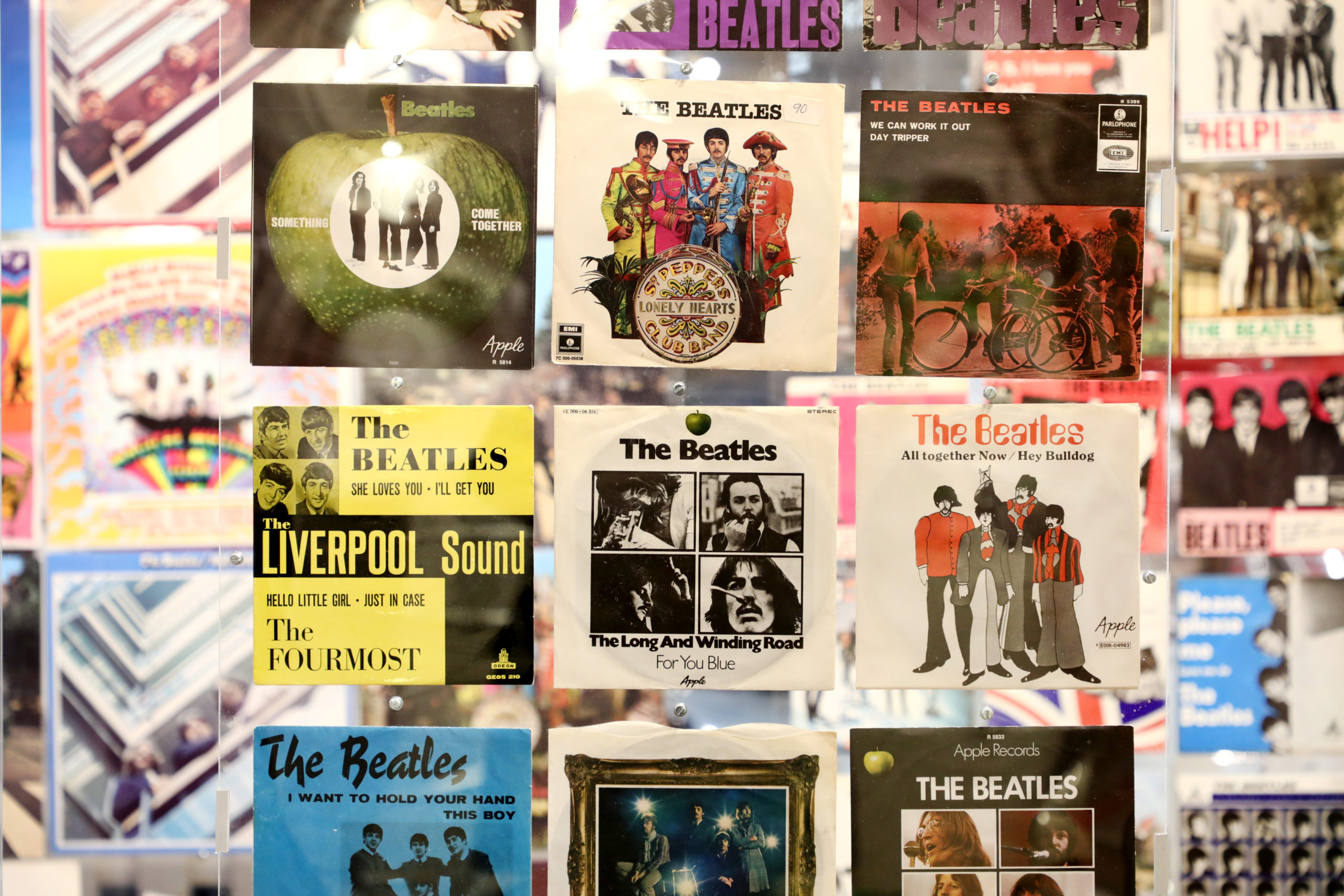 considerably older. Yet, when “Get Back” was shot, Ringo and John were just 28, Paul was 26, and George was the baby – a mere 25 years-old.
considerably older. Yet, when “Get Back” was shot, Ringo and John were just 28, Paul was 26, and George was the baby – a mere 25 years-old.
All four look much older than that in January 1969, even compensating for the hair and facial growth. And while they have their share of laughs in the studio, it is clear the weight of being the Beatles has taken its toll.
In just five short years, the Beatles have produced a dozen albums, five films, and other byproducts that are all part of the Beatlemania years. Their decision to stop touring in 1966 was obviously born out of a feeling of burnout and exhaustion.
While it’s easier to be a top-rated morning show or prime personality, the pressures of the ratings, the hours, the appearances, and prep and performance can take their toll.
9. There’s comfort in nostalgia and reliving past accomplishments – Even for the Beatles. Throughout all three segments, when things get a little tense and various members of the band need a release, they start jamming on something old. It could be the Everly Brothers, Chuck Berry, or Eddie Cochran. Often, it’s old Beatles songs.
Paul and John are especially likely to fall back into nostalgic oldies when things start getting tense. It’s almost as if this old stuff works like “comfort music,” calming and recentering them as they attempt to create the next big thing.
Lennon sometimes speaks in old Beatle lyrics, making you wonder whether those old lines are forever echoed in his head. But the settling effect of familiar standards and yes, oldies, was not lost on me while watching much of “Get Back.”
10. All you need is humor – You see it happen again and again. John, Paul, George, and Ringo weren’t just great performers, singers, and musicians – they were genuinely funny. Famous actor/comedian Peter Sellers visits them at the studios, and they come off a lot funnier and more spontaneous than he does. He even seems a bit taken aback by how quick they are with the good line or comeback.
At other points, they lighten up their team, their wives, and girlfriends with humor and levity. As bad as these sessions go, especially early on, the Beatles mostly overcome the friction with their humor. It helps.
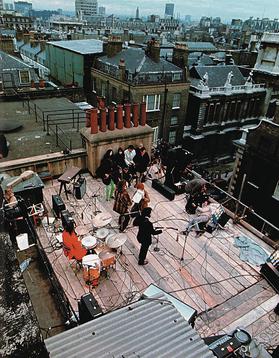
11. Every performer needs a rooftop concert – Thanks to Huffington Post’s Brittany Wong for this one. The final scenes in “Get Back” are all shot at that final performance, somewhat spontaneously staged on the roof of Apple headquarters. It’s very much a case of getting back to where they once belonged – playing live in front of people.
After watching the band struggle and screw around for nearly 7 hours in the studio, it’s almost a revelation to watch them play live for an audience for the first time in nearly three years.
Up on the roof, they don’t miss a beat – they are tight, play wonderfully together, the vocals are stellar, and you’re instantly reminded just how supremely and profoundly talented they truly are.
The scenes on the street below are precious, and provide a great commentary on those times, and how things have changed.
But the rooftop concert is more than just a symbolic effort. For most of us now, it is the only way we’ll see a Beatles performance that isn’t in front of a screaming, hysterical stadium crowd, dulled by the decades.
This performance is proof positive of what a great live band they were, above and beyond the writing and producing of albums, films, and other media.
Their musicianship is remarkable, especially given the cold conditions on the roof of a London building in the winter of 1969.
It’s the last time the Beatles will ever play together. As the band leaves the roof, John fittingly gets the last word, a line you’ve heard him utter before:
“I’d like to say thank you on behalf of the group and ourselves
And I hope we passed the audition.”
It takes on a much different meaning, as “Get Back” wraps up.
There are important lessons here for all of us in radio, but especially the shows, teams, and ensembles that come together to make great personality radio. It is a major challenge to maintain a high level of professionalism and commercial success, especially under the critical eye of fans and the press.
The Beatles did it before there was the Internet and social media, of course. There are references to trying to reach John and other members of the band by phone – often to no avail. And you can only imagine if the Beatles, their team, and families were carrying around smartphones during the making of “Get Back.” What is already uncomfortable would have become unbearable.
I cannot recommend “Get Back” enough, despite its length and time commitment. It is more than just a music documentary.
Much more.
I’m not Taylor Swift, but I have left a number of “Easter Eggs” in today’s post – Beatles titles and lyrics.
Thanks to Gary Graff for inspiring this post.
- What To Do If Your Radio Station Goes Through A Midlife Crisis - April 25, 2025
- A 2020 Lesson?It Could All Be Gone In A Flash - April 24, 2025
- How AI Can Give Radio Personalities More…PERSONALITY - April 23, 2025




One word … Brilliant.
Great blog, Fred.
Appreciate.
Fred, OUTSTANDING. A great read to start the anniversary week of the Beatles topping the charts and in our hearts. Placement of their music and coordinating teams, presentation and connected content remains front & center. Radio done right will rebuild the new Roaring ’20s.
Thanks for this, Clark. Much appreciated.
Brilliant blog. I walked away from the doc feeling that we missed so much ‘live’ music because they stopped touring. The rooftop concert was proof positive that The Beatles were the best live band of their time.
Totally, Chuck. I was totally blown away by their musicianship AND showmanship. Thanks for the comment.
Great piece. Trivia Bonus! Billy Preston was the only musician to play in the studio with both the Beatles and the Stones. Eric Clapton played with the Stones on their “Flashpoint” live album from 1991, guesting on “Little Red Rooster.” as well as his well known contribution to “While My Guitar Gently Weeps.”
Interesting how Clapton keeps popping into the conversation these days. Overrated? Racist? And does it matter to his fans?
Boom!
You nailed it Fred, all around!
It’s funny…as you may(or may not)know, I host, write & produce a weekly syndicated Beatles show aptly called BEATLES WEEKLY.
Doing this show for 8 years, and like you, I’ve come to realize I may know a lot about The Beatles, but there are so many others who know SO much more. And that’s ok, because there’s 1 thing we all have in common; we all love The Beatles! And we want their legacy to live on forever.
Fab blog, especially this morning, Fred!
So which Beatle are YOU?
(I think we’re both “Pauls”)
I’d like to think I’m Paul. But that may be wishful thinking. After all, he was the cute one. I don’t think I qualify.
You had me at The Beatles but Creativity, Collaboration, And Chemistry closed the deal. Of course I had to read your takeaways and they are right on point.
Well done sir : )
Many thanks, Billy.
…..and what do we think the outcome of the Beatles music would have been if they were all working remotely as much music is done today?
Curious.
Brian, I read and re-read your question a few times. And my gut reaction is that yours is a valid question. And while “Get Back” was made in an era where telephones had “answering machines.” It is hard to imagine the Beatles could have pulled off songwriting in a Zoom era. But I’d be curious just how productive any collaborative band could be under these circumstances. As we saw in the doc, the Beatles needed to be in the same room, painful as it was at times.
Thanks for the kind nod in your excellent column Fred. Without over-mythologizing them, The Beatles story has so many life lessons for us all – along with some damn fine adventurous music along the way. Thanks for elevating a few of them from GET BACK for us in radio.
If fans of the new GET BACK film are hungry for more, there’s this I did 11 years ago with some top music writers. Hour 1 offers a sort-of radio version of what Jackson did in his 8 hours in film. Lots of the same fly-on-the-wall audio. Perhaps of more interest now, for those who’ve seen Jackson’s amazing film, is Hour 2 – essentially, what happened NEXT – after the rooftop concert. As Mikal Gilmore says, a story of “true transcendence” of the Beatles putting their differences aside to create greatness (another lesson we can take) in crafting ABBEY ROAD.
I listened to this again yesterday and teared up when the story hits their final moment together as a foursome again, at an August 1969 photo shoot. Never were they to be – all four – in the same place at the same time again…. as far as anyone knows.
https://exchange.prx.org/pieces/42248-the-last-year-in-the-life-of-the-beatles-1969-19
Paul, you have long been a student of Classic Rock for decades. Thanks for sharing your wisdom in these comments.
As a fan who’s always “hungry for more,” thanks, Paul, for posting your program! I’ll be looking forward to hearing it!
Loved today’s blog and agree with everyone’s comments. But the Fred’s Beatle Bar picture is priceless! The photo is a true classic!
I obviously have no more shame. Did I mention there were Beatles wigs as prizes for the Twist and Limbo contests?
Beyond insightful- this is up there in the masterpieces of media commentary – yes, I said “masterpiece”
Thank YOU, Tom. Means a lot.
Even without seeing the movie, just reading your blog gives me chills, Fred.
The Beatles were, hands down, the best rock and roll band ever. In my opinion, of course, but an opinion obviously shared by a lot of people … including you.
Thanks for taking the time to write this longer-than-usual blog entry.
I figured if “Get Back” was painfully long, than my blog post could be, too. 🙂
Long, yes. Painful, not by a long shot.
Not at all. I got fidgety at times, but I think that was due to the band failing to figure it out and make decisions. I’ve worked with shows that couldn’t make up its mind about anything and those are hard to manage.
Thank you, Fred.
This is a great piece. I love the way you tied it to management themes.
Of the four notable reviews that I’ve read commenting on and analyzing this special Beatles production, yours was the most authentic and relevant, Fred. In every previous review, I couldn’t help think “these guys are like the air staff of a few radio stations I worked at,” but only your review connected the dots and provided context as it relates to our business and some of the creative, driven, funny, sensitive and sometimes (benevolently) twisted people in it. As one of the tribal elders remarked early in my career, “it ain’t like workin’ in a bank or an accounting office.”
All I can say to the praise above is “ditto”.
Thank you for pointing out how young they all were at the time too. My wife and I were just talking about that over the weekend.
But now that we know more about the Beatles personalities and working dynamic, I’d be interested in what you think about Paul taking that shot at the Stones.
I did not see that coming and it doesn’t square with the image Paul has cultivated over the years.
Unless of course the real Paul is dead and that an impost…..nah.
Anyone who’s been involved in the creative process with other people will especially find the “GET BACK” documentary stimulating in so many ways, but Fred, your summary is stellar and very much appreciated.
Thank You
Fred,
Per usual, the man who ‘invented’ Classic Rock, opines brilliantly on the “Get Back” documentary.
You had me at Fred’s Beatle Bar, and went into the stratosphere with keen insights.
P.S. We will work on that cup of coffee with Richard…
Now THAT would be a coffee klatch! Many thanks for the kind words. Means a lot from someone whose oxygen is this music. Appreciated, Sky.
What can I possibly add to today’s blog or any of the comments! I just want to stand and say, Bravo!!
The one thing no one has mentioned–that I almost did a spit-take on–was when you said the Billy Preston photo was taken at the White House…in 1974!!! Wait, what?? I just couldn’t imagine a Richard Nixon White House hosting Billy Preston! I had to look it up and, sure enough, it wasn’t quite as “Bizarro World” as Preston visiting Nixon, but still, “Bizarro World” enough. Here are links to two of the photos I found. Wow, who’d have ever thought you’d see Billy Preston, George Harrison and President Ford…come together? Get back, Jo Jo.
https://www.whitehousehistory.org/photos/an-ex-beatle-at-the-white-house-photo-2
https://www.whitehousehistory.org/photos/an-ex-beatle-at-the-white-house-photo-3
David, I was just trying to find a photo I could easily use, and skipped over the year and who was sitting in the White House. Remarkable set of circumstances, right? Thanks for sharing this.
Excellent post, Fred.
Like you, I was mesmerized by the documentary – even at 7+ hours, it never felt long as we got to see the actual human relationships as they were.
Two big takeaways for me – one for leaders and one for talent:
For Leaders: Even though they act like they don’t want it, creative talent desperately need both coaching and management. These are two very different functions, and both are vital. The Beatles received lots of brilliant coaching during the creative process, from George Martin. The film showed us how a lack of management put tremendous strain on the band. And ultimately, in a cry for help, they brought in very bad management (Allen Klein), which was the final straw that broke the band apart. Great managers of creative talent are empathetic to and protective of the talent, they work hard at building trust, and they step up to make the tough decisions that put the talent into position to do their best work.
For Talent: Great work doesn’t just spill out of you spontaneously. Your best work results from writing, editing, practicing, revising, constantly working on your idea until it’s actually ready for showtime. It can be a grind. Sure, performance is the fun part, but it’s only the tiny tip of the iceberg. And you’ll never be a great performer if you don’t put in the work before the mics come on.
Carl, you’re spot on with these observations. You’re especially right about Klein. John Lennon was mesmerized, but we know it didn’t work. Maybe the only thing worse than no manager is a bad manager.
Excellent post. I could not help but think that this movie could make a great base for teaching collaberation and music writing.
Dorothy, that’s I saw it. Lots of wisdom here, along with things to do, things not to do. Thanks for your comment.
Best piece you’ve ever written. My Bar Mitzvah, in January, 1965, was also Beatles theme. Your insights here are perfect…. and have inspired me to watch Get Back again. The resulting conclusions you have drawn are applicable to any process. Thank you.
Appreciate it, Alan. How many fountain pens did you receive as gifts?
“truly great pieces of art in whatever format you choose cannot simply be cranked out, much less duplicated anytime at all, on-demand” such an important thing to recognize and acknowledge. Enjoyed your smartphone reference I believe the trajectory of The Beatles story would have gone in a completely different direction. I really enjoyed this very much Fred
Kim, I’m glad the post resonated for you. I loved this special look at true artists of the 20th century whose music will be enjoyed for all time. It was fun and helpful for me to think about the radio applications while I watched the Beatles struggle to create great music. The fact they succeeded against the odds is inspiring for those of us cast in pressurized situations where the clock is ticking. Thanks for responding to it.